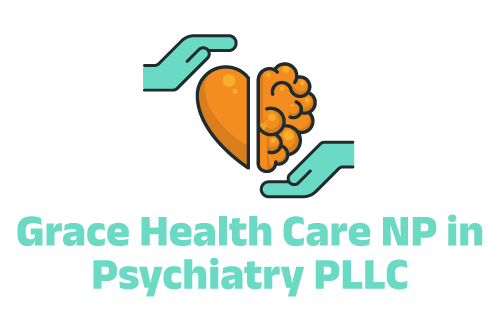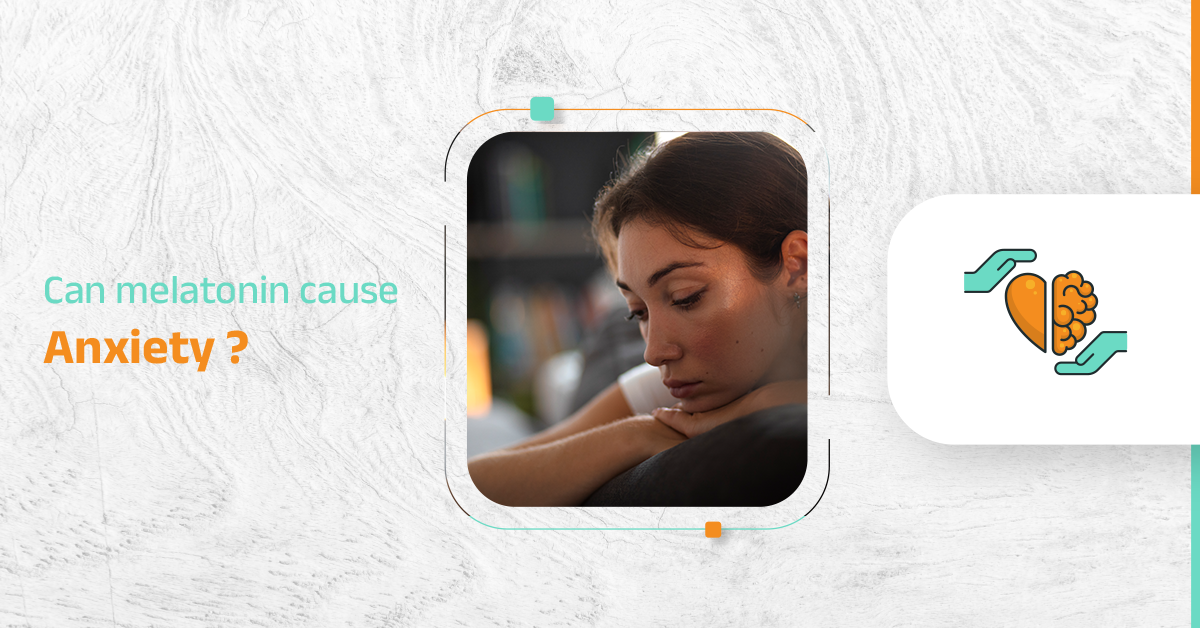Melatonin from the pineal gland controls our sleep cycle. It’s additionally under examination for anxiety therapy. Anxiety conditions are typical and can interrupt everyday life.
Knowing “Can melatonin cause anxiety?” is vital for safe use. People often take Melatonin to combat sleep issues, jet lag, or work shifts.
As insomnia treatments gain popularity, concerns about Melatonin’s side effects grow.
Are you struggling with anxiety? Grace Healthcare offers personalized solutions and support so you can regain control and find relief. Contact our team for specialized care.
Below, we will delve into the connection between Melatonin and anxiety. We’ll look at the Melatonin risks, benefits, and crucial points for those considering melatonin supplements.
What Is Melatonin?
Melatonin is a natural agent that influences sleep. Its levels rise at night to promote sleep and fall in the morning, triggered by sunlight. Small amounts are found in some fruits and vegetables, but it is primarily available as a supplement.
These supplements increase melatonin levels, helping to signal sleep. Melatonin regulates our sleep and body clock. Its supplements help with jet lag and insomnia. They align with our internal clock, promoting better sleep.
Taking melatonin supplements increases levels to help sleep. They are most effective for jet lag but can also help with other sleep issues. Understanding their role and effects is important for the best results.
Can Melatonin Cause Anxiety?
Melatonin is popular for sleep. But it can cause unexpected reactions in some people. Many people use it without problems.
However, Melatonin can cause anxiety, restlessness, and discomfort in some people. This effect seems strange, as Melatonin is meant to promote calm.
Reports of restlessness and unease show the supplement’s complexity.
Despite its calming reputation, Melatonin affects everyone differently. It highlights the need for personal awareness when using sleep aids.
Why Might Melatonin Cause Anxiety?
The bond between Melatonin and anxiety isn’t evident. Possible reasons include:
-
Impact on Neurotransmitters
Melatonin changes brain chemistry. It affects serotonin and dopamine, sometimes causing anxiety.
For some, this leads to unease and worry. A disrupted balance makes people feel tense.
-
Incorrect Dosage
Melatonin is not risk-free. Taking too much causes restlessness, nightmares, and panic, which can be mistakenly seen as anxiety. So, it’s essential to use Melatonin in moderation.
Overdoing it can disrupt sleep instead of helping. Users should be careful and pay attention to their bodies to avoid problems.
-
Disrupted Sleep Cycle
Misusing Melatonin can worsen sleep problems. Wrong doses or timing disrupt natural rhythms, leading to sleep deprivation and increasing stress. It creates a cycle of sleeplessness and worry.
Melatonin Risk Awareness
Knowing the melatonin risks is crucial. Despite being natural, melatonin supplements need guidance. Here are some risks of taking Melatonin:
- Dependency: Some may rely on Melatonin for sleep, struggling to sleep without it.
- Next-Day Fatigue: Using too much can make you less alert the next day. It disrupts engagement and performance. Tasks become more problematic due to mental fog, similar to a hangover. So, moderation is crucial for sharp thinking.
- Anxiety and Mood Changes: Melatonin can cause anxiety or mood swings in some users. People react differently. What relaxes one person might upset another.
Can Melatonin Cause Anxiety in Children?
Families may ask, “Can melatonin cause anxiety in Kids?”
Melatonin can help children’s sleep, but its effects vary. Children, being sensitive to hormonal changes, risk side effects like anxiety and mood swings.
Doctors often recommend parents focus on good sleep habits over long-term melatonin use. Possible downsides of melatonin in children include daytime drowsiness, nightmares, and irritability.
A 2021 review showed melatonin doesn’t work for neurotypical children. It suggested avoiding it in children without neurodevelopmental disorders.
Is It Bad to Take Melatonin Regularly?
Melatonin is okay to take regularly for short periods. Its long-term effects are unknown. Melatonin regulates sleep cycles and helps with jet lag and shift work sleep issues.
However, it may cause dizziness, headaches, or daytime sleepiness. Its impact on natural melatonin production is also uncertain.
So, consult a doctor before using it for more than a few weeks. Short-term benefits typically outweigh the risks. But, be cautious with long-term use.
Everyone reacts differently. Thus, professional advice is crucial for safe, effective use. Doctors consider personal health and sleep issues causes.
Can Melatonin Make Your Body Ache?
Yes, Melatonin can cause body aches in some people, but this is rare. It mainly helps with sleep. However, it can lead to:
- Muscle Aches: Some might experience muscle pain or body aches. It could be due to a high dose or sensitivity to hormone changes.
- Joint Pain: It can rarely cause joint pain or stiffness. This might be linked to inflammation or poor sleep, which can affect recovery.
If body aches persist, it’s wise to talk to a doctor. They can recommend the best sleep aid or suggest adjustments.
Natural Ways to Manage Sleep and Anxiety
Suppose you’re concerned about the risks of taking Melatonin. Try these natural ways to sleep better and reduce anxiety:
Relaxation Techniques: To sleep better, use slow breaths, quiet reflection, or gentle muscle relaxation. These methods calm your body and mind, making sleep easier.
Exercise: Regular exercise improves sleep and calms nerves. However, avoid intense workouts before bed. Moderate activities earlier in the day are better for sleep and peace of mind.
Healthy Diet: Avoid coffee and heavy meals before bed. Instead, snack on nuts or spinach. Magnesium-rich foods improve sleep.
Consistent Sleep Schedule: Leap out of bed at a set hour each day. Your body’s clock needs this. It improves sleep and makes mornings more manageable, starting your day off right.
When to Stop Using Melatonin?
Stop or reduce Melatonin if you experience adverse reactions. Symptoms like anxiety or mood changes indicate a need for caution. Despite being “natural,” this hormone is potent.
Always consult a doctor for safer sleep help. They can suggest better alternatives. Treat Melatonin with care, seeking professional advice.
Conclusion
So, can Melatonin cause anxiety? Yes, it is possible, mainly if misused or without professional guidance. Melatonin helps many people sleep. But it can cause side effects.
Anxiety spikes, moods shift, and panic attacks occur suddenly. These symptoms worsen, causing emotional turmoil.
The downsides of Melatonin may outweigh its benefits for some, especially children and the anxious.
Consider Melatonin’s benefits and drawbacks. Always seek medical advice before starting supplements.
Understanding Melatonin risks is vital for sleep and mental health decisions. Your doctor provides personalized advice.
FAQs
Q: Can too much Melatonin cause anxiety?
Yes. Too much Melatonin can cause anxiety in some people. High doses might disrupt sleep and increase nervousness. It worsens the very issues it aims to solve.
Q: Can low Melatonin cause anxiety?
Yes. Sleep relies on Melatonin. Low levels can disrupt rest and increase stress and anxiety. This hormone’s balance is crucial for nightly sleep and daily calm.
Q: Can Melatonin cause depression and anxiety?
Yes, Melatonin can cause mood swings. High doses or long-term use increase risks. It might lead to unexpected depression or anxiety. So, watch for minor changes in your mental state. Effects vary by person. Stay alert and make adjustments if needed.







No comment